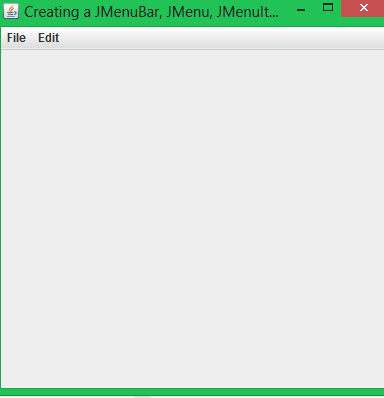In this section, you will learn about creation of
menus, submenus and Separators in Java Swing. Menu bar contains a
collection of menus. Each menu can have multiple menu
items these are called submenu. Similarly, all
menus have multiples menu items. The Separator divides the menu items in a
separate groups like same types of menu Items are divided into a individual parts.
The following are the classes which are used while creating menus in java
JMenuBar:
This is the class which constructs a menu bar that contains several menus.
JMenu(String):
This is the constructor of JMenu class. This constructor constructs the new menu. It takes the string type value which is the name label for the menu.
JMenuItem(String):
This is the constructor of JMenuItem class which constructs new menu items for the specific menu. It takes string types value which is the label for the menu item.
JSeparator():
This is the constructor of JSeparator class which adds an extra line between menu items. This line, only separates the menu items.
setJMenuBar():
This method is used to set the menu bar to the specified frame. It takes the object of the JMenuBar class.
Example of a code with menu bar and menus and menu items
The output of the above program is as shown below
The image below shows the menu items with a seperator between open and close menu items.

The following are the classes which are used while creating menus in java
JMenuBar:
This is the class which constructs a menu bar that contains several menus.
JMenu(String):
This is the constructor of JMenu class. This constructor constructs the new menu. It takes the string type value which is the name label for the menu.
JMenuItem(String):
This is the constructor of JMenuItem class which constructs new menu items for the specific menu. It takes string types value which is the label for the menu item.
JSeparator():
This is the constructor of JSeparator class which adds an extra line between menu items. This line, only separates the menu items.
setJMenuBar():
This method is used to set the menu bar to the specified frame. It takes the object of the JMenuBar class.
Example of a code with menu bar and menus and menu items
import javax.swing.*;
public class SwingMenu{
public static void main(String[] args) {
SwingMenu s = new SwingMenu();
}
public SwingMenu(){
JFrame frame = new JFrame("Creating a JMenuBar, JMenu, JMenuItem and
seprator Component");
frame.setDefaultCloseOperation(JFrame.EXIT_ON_CLOSE);
JMenuBar menubar = new JMenuBar();
JMenu filemenu = new JMenu("File");
filemenu.add(new JSeparator());
JMenu editmenu = new JMenu("Edit");
editmenu.add(new JSeparator());
JMenuItem fileItem1 = new JMenuItem("New");
JMenuItem fileItem2 = new JMenuItem("Open");
JMenuItem fileItem3 = new JMenuItem("Close");
fileItem3.add(new JSeparator());
JMenuItem fileItem4 = new JMenuItem("Save");
JMenuItem editItem1 = new JMenuItem("Cut");
JMenuItem editItem2 = new JMenuItem("Copy");
editItem2.add(new JSeparator());
JMenuItem editItem3 = new JMenuItem("Paste");
JMenuItem editItem4 = new JMenuItem("Insert");
filemenu.add(fileItem1);
filemenu.add(fileItem2);
filemenu.add(fileItem3);
filemenu.add(fileItem4);
editmenu.add(editItem1);
editmenu.add(editItem2);
editmenu.add(editItem3);
editmenu.add(editItem4);
menubar.add(filemenu);
menubar.add(editmenu);
frame.setJMenuBar(menubar);
frame.setSize(400,400);
frame.setVisible(true);
}
} The output of the above program is as shown below
The image below shows the menu items with a seperator between open and close menu items.

0 comments:
Post a Comment